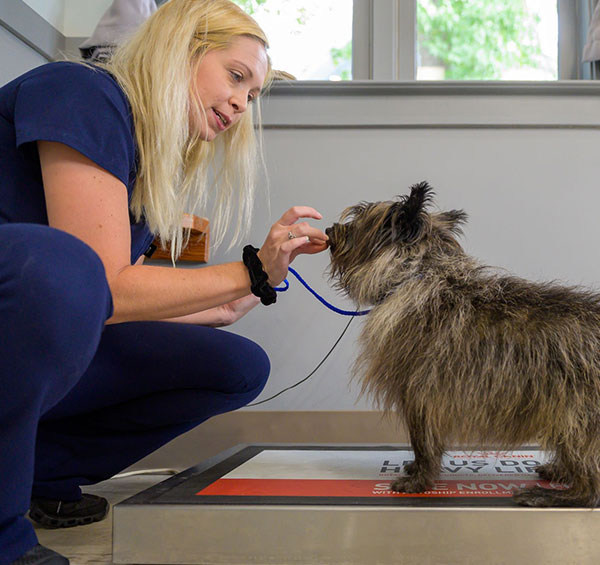
Physical rehabilitation is a treatment modality that has been incorporated into human healthcare for decades. Physical therapy is now a standard & helpful treatment modality for pets as well. Whether your pet needs to recover from surgery or injury – or needs a boost as an athlete, Mount Pleasant Animal Hospital offers top-notch pet physical rehabilitation in Mt Pleasant SC. Physical therapy and rehabilitation for pets have continued to evolve for veterinary patients to enhance pet surgical recovery, maintain a comfortable quality of life, or achieve higher performance in events such as agility competitions.
Our very own Dr. Marian Shuler Holladay (DVM, CCRP, CVA), a Certified Canine Rehabilitation Practitioner, can develop a rehabilitation plan, provide physical therapy, and design sports conditioning protocols for your pet. Whether it is for complete healing, lifelong management of a specific problem, or simply getting in condition to play hard, our pet rehabilitation services & program will be developed specific to your pet’s needs.
The goals of cat and dog physical rehabilitation are quite simple:
- Increased function of the pet – being able to use all of its limbs to move around and function in daily life
- Decreased pain – due to chronic osteoarthritis or due to a recent surgery or injury
- Encourage healing – of a wound, a fracture, a sprain/strain
- Achieve higher athletic performance while staying injury free
Pet Physical Rehabilitation In Mt Pleasant SC: Sports Conditioning
Fly ball, frisbee, dock jumping, agility courses…all pose threats of injury. An athletic dog should be trained and conditioned for the events in which it participates. Different sports will predispose dogs to different types of injury, so care must be taken to condition and strengthen those areas most prone to injury. Even if you don’t have a 4-legged pro-athlete, we can help you prevent “weekend warrior syndrome” – a dog who is a couch potato during the week, then over-exerts himself on the weekend when his human friends take him out. The weekend warriors typically are the most prone to injury and can find pet physical therapy particularly beneficial.
Pet Physical Rehabilitation in Mt Pleasant SC: Sports Conditioning
Fly ball, frisbee, dock jumping, agility courses…all pose threats of injury. An athletic dog should be trained and conditioned for the events in which it participates. Different sports will predispose pets to different types of injury, so care must be taken to condition and strengthen those areas most prone to injury. Even if you don’t have a 4-legged pro-athlete, we can help you prevent “weekend warrior syndrome” – a dog who is a couch potato during the week, then over-exerts himself on the weekend when his human friends take him out. The weekend warriors typically are the most prone to injury, so pet physical therapy is particularly beneficial in this scenario.

Pet Physical Rehabilitation in Mt Pleasant SC: Weight Loss
Appropriate nutrition is the backbone of a weight loss program. However, physical activity also is important. We would never ask a morbidly obese person to begin their physical activity with a marathon. Likewise, with animals, we need to condition them to activity, slowly building strength, stamina, and muscle. We guide you through the nutritional aspects of weight loss, as well as develop a physical regimen to keep your pet fit.



